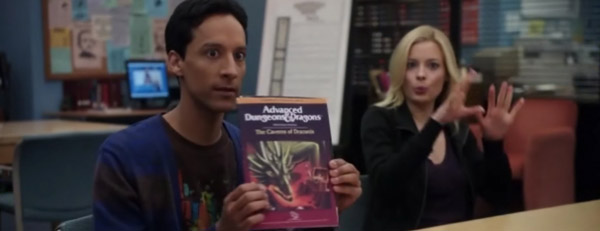Kris and I tried watching Community when it first came on the air, and while we thought it was sort of cute, it initially felt like it was trying too hard, it was too gimmicky, and that it was overstuffed with less-than-interesting characters. I think we stopped watching after a few episodes.
We picked it back up somewhere in the middle of season two, and it’s now one of our favorite shows. It’s still pretty gimmicky, but it’s incredibly funny and clever and has a lot of heart.
I’m bringing this up because The Onion’s AV Club has published a series of interviews with the show’s creator, Dan Harmon, and wow. They’re incredible. I’ve honestly never seen such a candid, honest revealing interview with a show creator, especially not while the show is still on the air. Sure, you might find some interviews with the writers of The Wire or Cheers or something, years after the show has ended, taking about the overall theme of their show, or recalling some memorable moments, discussing specific episodes, or sharing random anecdotes, but Harmon really opened up to the AV Club, discussing every single episode of season two at great length.
Here’s an except from his thoughts on the episode Advanced Dungeons & Dragons:
We spent two days writing it, and we finished it, and we read it through, these two gentlemen and I at Andrew Guest’s house. His girlfriend made us Pop-Tarts and we had a little shot of cognac or something. We’d been up all night. We almost cried because we were like, “God, that was fucking hard.†And it was so satisfying. “What a nice little story this is. Let’s get to that table-read.†And we did it. We threaded the needle. We made Dungeons & Dragons accessible. We went and table-read it, and it was a great table-read, people loved it. The director, Joe Russo, was like, “I can’t wait to shoot it. I don’t have any thoughts about how to improve it. I think it’s great.â€
The studio and network response at the table-read was so removed from that. They were so upset about the crime of this episode having been written. The note session as a whole was preceded by a 45-minute period of them walking around the lot whispering to each other. They told me they would come up to my office and meet me privately. When they came up, I had the director and all of the writers in the office with me, because I was terrified. They sat down, and they said, “Look, where do we start?†I couldn’t believe this was happening. I was like, “This is opposite of how you should feel right now. This is a great episode. We’re going to get a 1.7 no matter what. We will build our ratings in other ways. The episode is not about credit cards; it’s not about Hilary Duff. It’s going to get the same numbers. There is a cultural build to a hit show. We have to prove to people that we’re capable of good things so they can trust us, so that we can have a relationship. One day we will either be a highly rated show or we’ll be cancelled. It will not have to do with this moment. This episode is good, the story is good, these characters are good. Anyone who doesn’t tune in because the commercial says they’re playing Dungeons & Dragons, it’s not my fault. It’s not on me.â€
It was such a depressing note session, because they didn’t even have any notes on the story. They just didn’t want it to exist. I took a photograph of my eyes driving home that day at 3 p.m. because I was leaving work early. I looked in my rearview mirror, and I was crying. More than crying, I was red-eyes, tears streaming, weeping. And I was weeping out of self-pity and frustration, like a child weeps when he doesn’t understand his parents’ rules. “Why can’t I have ice cream when I ate my liver?†I took a photo of it, so I could show it to them between seasons, because as I told my girlfriend when I got home, “I think I’m going to have to quit my own show, because I can’t operate under these circumstances. I can’t be this proud of something that the people paying me to do it are this ashamed of. It will never work. We’ll never achieve anything. It’ll never connect.†So it was the best of times and the worst of times.
If you’re a fan of the show, or have any interest in how good television is made, you should read the entire series of episodes:Â Part 1, Part 2, Part 3, and Part 4. Passionate, funny, remarkable and revealing stuff.
